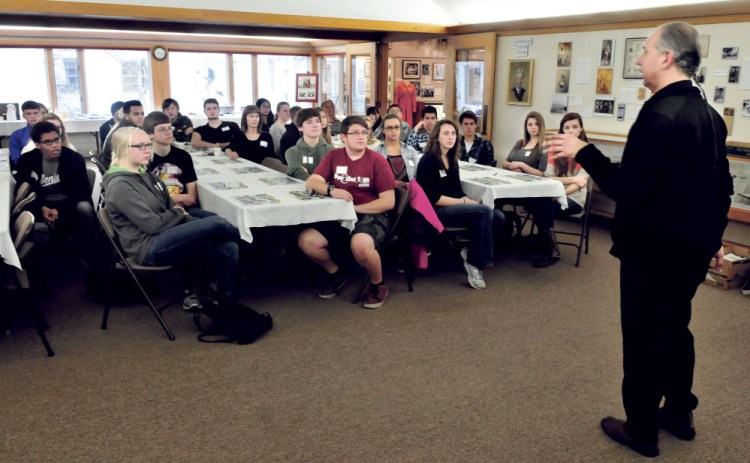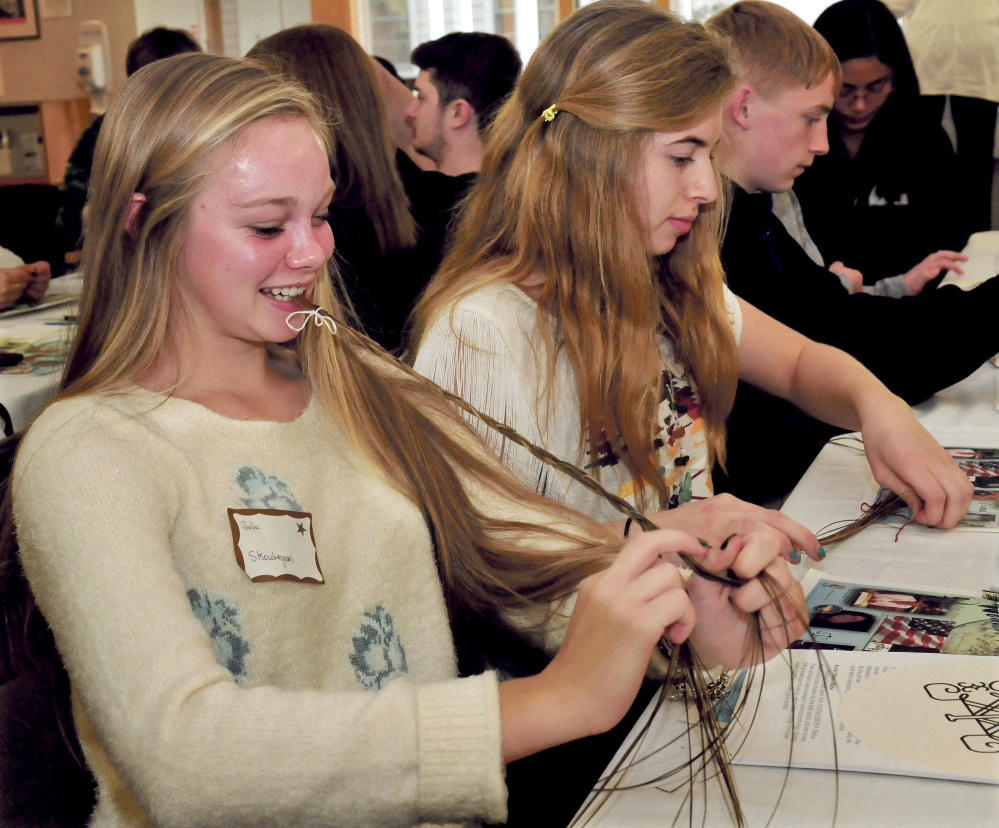SKOWHEGAN — John Bear Mitchell, a member of the Penobscot tribe and associate director of the Wabanaki Center at the University of Maine, used storytelling and humor Thursday to teach high school students about his people and their culture, history and identity in the modern world.
“When you get to know someone, you no longer fear them,” Mitchell told a rapt audience of about 40 students from three area high schools during a symposium at the Margaret Chase Smith Library. “If you know somebody, you won’t fear that they have something you don’t have; you won’t fear that they’re trying to take you over personally. In other words you understand them as being equal.”
Mitchell told stories passed down in the Native American oral tradition, including teachings of the first storyteller, Chabalak, who taught early people stories of the formation of land, why animals look the way they do, how to be a good person and that nobody is unimportant. Chabalak, through his stories, taught about his people and their values, traditions and history and that everybody needs to tell their story and that everybody is important, Mitchell said.
One day Chabalak did not come out of his home and two small boys were sent in to find out why. Chabalak said he was tired. He then suddenly vanished to become part of the spirit world but left behind the notion that information is a light above everyone’s head, ready to be grabbed and consumed, then returned for others to use.
Behind the humor and animation by Mitchell, there still was an underlying thread of the memory of the mistreatment, slaughter and displacement of the four federally recognized tribes of Maine — Penobscot, Passamaquoddy, Maliseet and Micmac.
“One of the things that happens with humor and how I try to portray what I’m doing through humor is basically not to make it as heavy, to lighten the impact, but to make a point,” Mitchell said after his three-hour presentation. “You’ve got to do that because some of things are so serious, so unbelievable, that if you can’t get it across to young people, then to them it’s just preaching.
“I don’t want to preach. I want to teach.”
Thursday’s presentation to students from Skowhegan Area High School, Carrabec High School in North Anson and Upper Kennebec Valley High School in Bingham was sponsored by Kennebec River Voices, a volunteer organization that aims to encourage civic discourse and provides venues for education about issues of diversity.
Before Mitchell’s presentation, students were asked what they wanted to take from Thursday’s teachings. Most said they wanted to learn more about Wabanaki culture and ways of life.
One student, Brandon Curran, a junior at Skowhegan Area High School, said he wanted to learn more about the “drama” surrounding the Indian nickname and mascot issue at his school. The high school is the last school in the state to have an Indians nickname. Various groups, particularly those representing the Wabanaki, have been pushing the school to get rid of it. Those supporting the nickname say it’s meant to honor the Indian heritage of the area and is a tradition for school alumni.
After Mitchell’s presentation, Curran said he was glad he had attended.
“I definitely learned more about the Indian side of the argument,” he said. “He explained to us that lots of tragedies … occurred to the Indian tribes, like way back when, and they’re obviously not still 100 percent over that. I can see the Indian side, definitely, but I can also see today’s people of Skowhegan that want to keep the mascot, also.”
Lindsey Warren, a Skowhegan sophomore from Mercer, said she had never heard from “an actual Indian” before Thursday and what their opinions were. All she has heard about the mascot issue is what she has heard in school, she said.
“I think his communication kind of opened my view a little bit more because it made me realize why they want to change it,” she said. “They want to change it because of all the tragedy that has happened and their land being taken. They’re really very kind people and they share everything. Skowhegan High School thinks that they’re doing them an honor, but I feel like, if it is offensive to them, then we should be open to listening to them.”
Mitchell, 47, spoke of issues that have affected Native Americans since the first arrival of settlers from Europe. He spoke of tribal names and languages all over North America.
He spoke of referendums in which voters reject Indian casinos while out-of-staters come and build their own gambling resorts. He spoke of “disease warfare” in bringing smallpox to the New World, and he read from a 1755 proclamation of Massachusetts, of which Maine was then still a part, announcing a bounty on scalps of Indian men, women and children. The lieutenant governor had declared the indigenous population to be “enemies, rebels and traitors” to the king of England.
“We didn’t understand the concept of land ownership,” Mitchell said. “We were hunted like animals — this is my little brother, he’s worth something if he’s dead — there were kids being killed and hunted.”
He spoke of the fact that Indians were not citizens of Maine until 1967. They could not vote, nor could they purchase alcohol. He spoke of Indian water rights on the Penobscot River and of ongoing court battles.
Mitchell, a third-generation resident of Indian Island, in Penobscot County, told students that when Europeans first arrived, the natives had no concept of land ownership, and they were driven out of land and massacred in places such as Old Point on the Kennebec River in what is now Madison, where some of Mitchell’s ancestors lived and died.
The symposium was facilitated by Janice Kassman, former dean of students at Colby College. Teachers who brought students to the library Thursday were Lisa Savage, from Carrabec; Paula Doughty, from Skowhegan; and Luke Hartwell, from Valley High School.
Dalayne Davis, a senior at Valley, said she liked Mitchell’s humor the most. She said she learned a lot about current events involving the Penobscots and their lawsuits involving water rights.
“I was really impressed,” Davis said. “I wasn’t expecting this. I learned a lot about his little icon (a Wabanaki symbol of the four tribes) I didn’t think they had symbolic things like this.”
Michaela Marden, a junior at Valley, said she came away with “a new perspective” on current events, such as the land ownership and water disputes with the state of Maine. As for the Skowhegan Area High School mascot, Marden said she now understands some of the concerns.
“They want to be respected and not made fun of or seen as a negative thing,” she said. “I learned what things mean a lot to certain people and why.”
Brandon Lambert, a senior at Carrabec High School, said he got a little bit of everything from Mitchell’s presentation.
“I feel like the natives wanted to be called as equals to everybody else in the state so they wouldn’t be discriminated from others,” Lambert said. “I believe he convinced me that natives are equal to any other person.”
Doug Harlow — 612-2367
Twitter:@Doug_Harlow
Send questions/comments to the editors.





